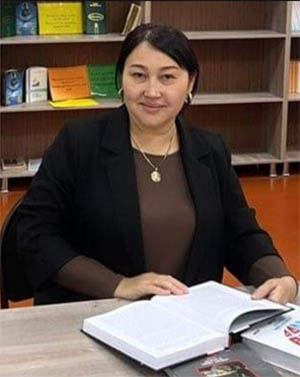Department of "Russian and Uzbek languages"
- 1053 views

Umaralieva Madina Adilbekovna
Head of the department "Russian and Uzbek languages".
magistr, senior teacher
✆ Phone: +7 702 286 8979
✉ E-mail: k-filolog@tashenev.edu.kz
- Mission and objectives of the department
-
The mission of the department is to provide students with in-depth study of the Russian and Uzbek languages, the development of intercultural relations, as well as the strengthening of language knowledge and communication skills.
The department uses modern methods in the educational process, strives to improve the language abilities of students, support research work and train future specialists.
The quality policy and goals of the department are aimed at the effective conduct of educational activities and play an important role in the professional development of students.
The objectives of the department play an important role in the development of Russian and Uzbek languages and strengthening intercultural ties.
- About the department
-
In the 2022-2023 academic year, it was transformed into the Zhumabek Akhmetuly Tashenev University, and the current department was renamed the Department of Philology. Candidate of Philological Sciences, senior teacher Botabaeva Zh.N. was appointed head of the department.
The Department of Philology trained specialists in the following educational programs 6B01701-Training of teachers of the Kazakh language and literature, 6B01702-Training of teachers of the Russian language and literature, 6B01703-Training of teachers: two foreign languages, 6B01704-Training of teachers of the Uzbek language and literature, 6B02301-Foreign philology, 6B01708 - “Russian language and literature in schools with Russian and non-Russian languages of instruction (IP)”, 7M01701-Training of teachers of the Kazakh language and literature.
In August 2024, in connection with the change in the status of the university and the reorganization of structural divisions, the Department of Foreign Languages was renamed the Department of Russian and Uzbek Languages.
Madina Adilbekovna Umaralieva, master’s degree, senior teacher, was appointed head of the department of “Russian and Uzbek languages”; a new teaching staff was formed, including experienced philologists. - Educational programs of the department
-
The department trains specialists in educational programs 6B01702 – “Training of teachers of the Russian language and literature”, 7M01703 – “Training of teachers of the Russian language and literature”, 6B01704 – “Training of teachers of the Uzbek language and literature”, 7M01704 – “Training of teachers of the Uzbek language and literature”.
These educational programs focus on training teachers in the field of education and include similar elements such as language and literature components, pedagogical methods and practical experience. Students combine theoretical knowledge with practice during the learning process and achieve professional success in their profession in the future.
- Teachers of the department
-
- Аbzalova Galiya Alikovna
- Jumabaeva Gulmira Rakhmatullaevna
- Kozhakhmetova Gulgan Bektaevna
- Botabaeva Janna Nuralievna
- Ergeshbaeva Shynar Nalhodjaevna
- Umaralieva Madina Adilbekovna
- Kemelova Gulhan Meimankulovna
- Azbergenova Zaure Ospanovna
- Asilbekova Bibigul Djienbekovna
- Aidarbekova Aliya Sarybaevna
- Tokmuratov Abdihan Majanovich
- Kyrkinbaeva Mira Bazarbaevna
- Abisheva Roza Berdalievna
- Stycheva Olga Andreevna
- Kalzhanova Altynay Kenzhemuratovna
- Конкабаева Гульназ Берикқызы
- Naralieva Shakhlo Dzhamalovna
- Musaeva Azadakhan Mubarakovna
- Abdaliev Farrukhbek Namadzhanovich
- Yuldasheva Gulnaza Abdivalievna
- Umbetzhanova Umsyn Tulegenovna
- Methodological work in the department
-
Educational-methodical works are carried out in accordance with the requirements and regulations of JSC "University named after Zhumabek Akhmetovich Tashenev". In this regard, the department's educational system is made using innovative methods of teaching (modular teaching principle, use of point-rating system, competence approach, etc.). This includes a greater focus on developing cognitive-communicative skills.

Add new comment